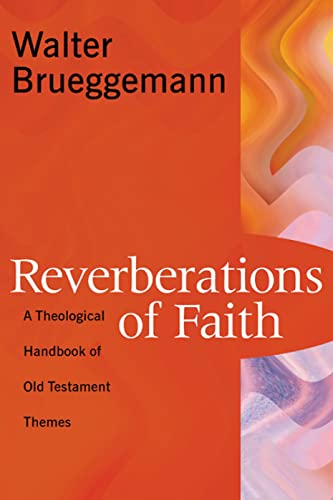REVERBERATIONS OF FAITH: A THEOLOGICAL HANDBOOK OF OLD TESTAMENT THEMES
Written by Walter Brueggemann Reviewed By Michael WidmerIn the ‘publish or perish’ culture, students of the Bible are often overwhelmed by a rapidly rising tide of secondly literature (to which Brueggemann has impressively contributed). What the OT novice or busy pastor needs is a reliable, user-friendly, and succinct guide to the message of the OT. The latest book from the prolific pen of Brueggemann seems to meet exactly these criteria.
In 105 concise ‘dictionary style’ entries Brueggemann unfolds the dominant themes of the OT. As the readership of Brueggemann expects, this book differs markedly from the established technical OT dictionaries, such as THAT, NIDOTT, by being overtly theological in orientation. Most entries live up to Brueggemann’s reputation as one who creatively engages with the text, not least to draw out enduring relevance from Israel’s witness.
Besides classical OT themes such as ‘Covenant’, ‘Election’, ‘Righteousness’, etc., one finds entries of less common nature, such as ‘Sexuality’, ‘Violence’, ‘War’, etc. The entries range from one to four pages. In other words, one of its strengths, given the nature of the book, is its well-targeted entry length. Concise enough to be interesting entry length. Concise enough to be interesting for the lay person and yet substantial enough to provide a good overview of the complexity of the topic in question. Each entry is followed by a selective yet substantial up-to-date bibliography for further reading.
The handbook is laid out in alphabetical order (from ‘Ancestor’ to ‘YHWH’) and its entries are supposedly widely inter-connected. A closer look at the cross-references, however, reveals clear inconsistencies. For example from the entry ‘Image of God’ one is referred to ‘Priestly Tradition’, ‘Sexuality’, and ‘The Fall’. One would expect the network to expand in this manner. However, there is not a single new cross-reference from any of these three entries.
Having said that, Brueggemann, with his immense learning, provides us with much more than information on a particular topic. He consistently imbeds the entries in a wider scriptural context (with frequent trajectories into the NT, cf. e.g. ‘Messiah’, ‘Resurrection’) and gives them a theological-hermeneutical focus.
The articles are usually structured in a threefold way: i) overview of consensus position; ii) introduction to interpretative issues; iii) some hermeneutical guidelines as to how the ancient texts may be related to contemporary believers. Thus for example the entry on ‘Prayer’ commences with an oversight of the various types of biblical prayers and finishes with thought-provoking hermeneutical reflections on some of the major differences between modern day spirituality and that of Israel.
Israel’s sustained practice of prayer demonstrates a trustful theological innocence. Modern, scientifically oriented … people find that innocence difficult to trust. As a consequence, prayer is regularly adjusted in the modern world: either prayer … does not really ask anything … or prayer is transposed into a psychological act of catharsis so as to make us feel better, or prayer becomes a group process of sharing. The innocence of this ancient faith is not readily appropriated among us, but we could begin by acknowledging that our conventional reductionisms of prayer are pale, inadequate shows.
I found it noteworthy that there is hardly any mention of intercessory prayer. This gap is further reflected in the omission of any treatment on the concept and role of covenant—mediator. With intercession being one of the major responsibilities of Israel’s prophets (Jesus and by implication of the church), I hoped to find some information under the entry of ‘Moses’, or ‘Prophet’—unfortunately without any results.
Despite some gaps in the material, I am convinced that this book meets a real need and will find a wide audience. From the interested lay person, via the time constrained student and pastor, to the expert who has the occasional five minute break to browse a less familiar field, this book offers a little gold-mine of ideas.
Michael Widmer
Durham







